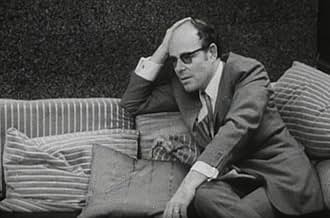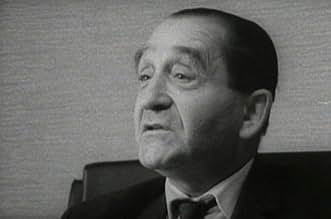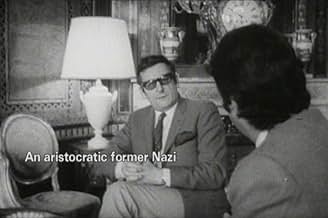Aggiungi una trama nella tua linguaAn in-depth exploration of the various reactions by the French people to the Vichy government's acceptance of the German invasion.An in-depth exploration of the various reactions by the French people to the Vichy government's acceptance of the German invasion.An in-depth exploration of the various reactions by the French people to the Vichy government's acceptance of the German invasion.
- Regia
- Sceneggiatura
- Star
- Candidato a 1 Oscar
- 6 vittorie e 2 candidature totali
- Self, former Wehrmacht Captain
- (as Helmuth Tausend)
- Self, general in the Wehrmacht
- (filmato d'archivio)
- (as General Stummel)
- Self, SS commander
- (filmato d'archivio)
- (as Zepp Dietrich)
- Self
- (filmato d'archivio)
- Self
- (filmato d'archivio)
- self, Former Mayor Of Combronde
- (as Monsieur Leiris)
- Self
- (filmato d'archivio)
Recensioni in evidenza
I concur with most of the comments from the other users. Certainly Ophuls' directorial hand is evident throughout, the editing, cutting, juxtaposition, reaction shots etc are all part of the construction of his argument, although his interviewees are obviously allowed to account for themselves at some length.
What I found most surprising was the amount of humour in the film. Because of Woody Allen's use of it in "Annie Hall" I thought it would be gruelling, but there were a number of laugh out loud moments, starting with the resistance leader whose main stated reason for fighting the Germans was that they were monopolising the best meat.
Emmanuel d'Astier de la Vigerie was also a total star. His comment about the sociological make-up of the Resistance - essentially misfits and malcontents, people with nothing to lose - was very telling. A number of other interviewees made similar points - the main collaborators were the bourgeoisie - the resistance was mainly based on workers, peasants, communists, youth and weirdos of various sorts. Compare that with the sitation in the '60s when the film was made and with the situation now in the western democracies.
Anthony Eden was another major surprise. The popular image of him now is of a buffoon, the man who screwed up Suez, but in the extended interview here he displays immense charisma, intelligence and humanity. And if they make a film of his life Jeremy Irons is a shoo-in for the role.
The Nazis, meanwhile, are clearly cut from the same cloth as the neo-fascists presently enjoying something of a resurgence in most of Europe. All the same arguments made in exactly the same way by the same sort of people. This (plus the smugness of the former Wehrmacht officer still wearing his medals) was probably the most chilling thing about the film.
The final obvious resonance is with Iraq. From the German soldiers baffled and outraged by the fact that some French were trying to kill them, to the French establishment referring to the Resistance as terrorists, (yes that was the exact word they used), to the initial acceptance of the Occupation turning to hatred as reprisals against the Resistance grew, many testimonies throw a radically new light on the present situation. To draw direct parallels would be a mistake - even the Gaullists were not as reactionary as Zarqawi or Muqtada al Sadr - but nonetheless there is a lot to learn from then about now, and about the difference between how events are perceived at the time and by History.
Another user comment complains about the amount of politics in the film. It's true that some knowledge is presupposed and the film would obviously mean more to those who lived through those times. However Ophuls has said that one of his main motivations was to show that the idea that you can divorce politics from everyday life is exactly what made collaboration possible.
These are just a few of the thoughts provoked by the film, which holds many more insights and surprises and I am sure repays as many viewings as Alvy Singer gave it. It's perhaps not as shocking or affecting as "Shoah" (on which it's surely the strongest influence) but then it's a different story. It shows us the best of humanity as well as the worst and neither are always where you might expect to find them.
Incidentally, it looks like the reportedly poor quality of the DVD may be down to the original film stock rather than the transfer.
The documentary selects a few dozen people to interview - virtually all with different roles and attitudes during the Occupation. I found particularly interesting:
the French doctor with "7.5 children" (?) who was concerned primarily with feeding his family throughout the Occupation and was thrilled when hunting began after a two year moratorium,
the champion bicyclist who began against great competition in 1943 because of the number of French riding bicycles due to the absence of gas to run their motorbikes or cars (and who said he didn't see many Germans around Clermont-Ferrand in Vichy France)
the extraordinarily gentlemanly and rather shy-seeming Resistance chief who refused to cooperate with the Communists in his ferocious anti-Nazi work,
the British transvestite singer who became a secret agent for the British in occupied France and broke up with his German soldier lover for fear of compromising him,
Anthony Eden's extraordinary tact and intelligence,
Pierre Mendes-France's wonderful restraint, objectivity, humor and
absence of recrimination,
the German father of the bride at a wedding reception whose attitude toward his (undoubtedly brave) service in the War is wholly uncolored by the fact that the country for which he fought was the aggressor, totalitarian, and vigorously persecutor of groups - (I actually suspect that if one were merely a soldier and had not personally acted dishonorably in the War, this is the attitude that most would have -whether a German or Russian soldier - despite extending one's own horrible system into the rest of Europe).
For one, such as myself, who does believe the Communist Party, especially in those days of Stalin, to have been as great a menace to the world as the Nazi Party, the documentary's failure to ever ask the Communist officials interviewed about their beliefs about substituting one horror for another is disappointing. I could not forget as I watched the interviews of Communists, the 14.5 million recently killed by the Russians in Ukraine as the result of the terror famine imposed on that region - or the Great Terror that killed more millions and concluded just as the War began. In fact, M. Ophuls discomfits the Resistance leader who defied Orders from the Free French in London to cooperate with the Communists against the Nazis - I felt like applauding his behavior!
I'm sure for most, the most fascinating character is M. de la Maziere, the extraordinarily candid, intelligent, disarming and charming aristocrat and former Fascist youth who, at the end of the War, volunteered to serve on the Eastern Front in the German Waffen S.S. - from which only 300 of the 5000 survived. He was quite remarkable to hear - he'd obviously spent a great deal of time thinking about what he had done, why, and although regretful, was unsparing in his description of what he knew and what he had done. However, in interviewing him in a German castle used between the Wars by the Kaiser, and in 1944 for Petain and Laval, the documentary makes it appear as if the castle somehow relates to de la Maziere - as if he owned it - when in fact Ophuls simply took him there for the interview. It's the one dishonest seeming moment in this wonderful documentary.
I strongly recommmend that others see it - you will wonder how you would react, and think about what those in your own country would react to foreign occupation.
Focusing on the town of Clermont-Ferrand, Ophüls tries to understand what it was to live with German soldiers in your town, an optimistic and collaborating government, an exiled general urging you to resist and underground organizations who used terrorism as their only weapon. Ophüls does not multiply the number of interviewees. He chooses about 15 of them and interviews them long enough that you understand their comments within the context of their personality and outlook. But the most surprising is the variety among the interviewees: a very courageous farmer, a reckless British spy, a British minister, a self-sufficient German general, a doubting German soldier, a chauvinistic bourgeois, a young nobleman attracted by the Nazi theories, a young disillusioned nobleman-philosopher ready to sacrifice his life, a clear-sighted Jewish government representative, a naïve woman, a Communist, a nationalist. You'll be surprised to find out who is the most perceptive of the bunch
Lo sapevi?
- QuizOriginally intended for French television. However, French broadcasters refused to show it arguing the documentary depicted occupied France as exclusively populated by traitors.
- Citazioni
Dr. Claude Levy: France is the only government in all Europe whose government collaborated. Others signed an armistice or surrendered, but France was the only country to have collaborated and voted laws which were even more racist than the Nuremberg laws, as the French racist criteria were even more demanding than the German racist criteria. It's not something to be proud of.
- ConnessioniFeatured in Io e Annie (1977)
- Colonne sonoreÇa Fait d'Excellents Français
Music by Georges Van Parys
Lyrics by Jean Boyer
Performed by Maurice Chevalier
I più visti
- How long is The Sorrow and the Pity?Powered by Alexa
Dettagli
- Data di uscita
- Paesi di origine
- Sito ufficiale
- Lingua
- Celebre anche come
- The Sorrow and the Pity
- Luoghi delle riprese
- Clermont-Ferrand, Puy-de-Dôme, Francia(Main location)
- Aziende produttrici
- Vedi altri crediti dell’azienda su IMDbPro
Botteghino
- Lordo Stati Uniti e Canada
- 13.082 USD
- Fine settimana di apertura Stati Uniti e Canada
- 5224 USD
- 26 feb 2023
- Lordo in tutto il mondo
- 13.082 USD
- Tempo di esecuzione4 ore 11 minuti
- Colore
- Mix di suoni
Contribuisci a questa pagina




























